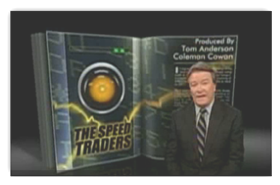If you did not see this on 60 Minutes this week, take a look and get educated on how fast things are moving today. Keep in mind we are insured for our healthcare with companies living right within the community too. When a healthcare claim is  filed, it’s going through technological motions just like the stock exchanges do and maybe not at the same speed, but the same principles. The healthcare you receive and what part of it gets paid is all determined by those algorithms.
filed, it’s going through technological motions just like the stock exchanges do and maybe not at the same speed, but the same principles. The healthcare you receive and what part of it gets paid is all determined by those algorithms.
A claim for payment when submitted is subjected to a number of electronic algorithms, some checking for accuracy, some for potential fraud, some verifying information and many other transactional processes that take place so the doctor or hospital gets paid A few months ago I was talking to an engineer at an aerospace company and he still had a vision of a group of employees sitting in a room manually working on claims. it’s all math and this is why we have ethics problems at times with a heavy reliance on numbers only, as healthcare is the people business and we are not 100% math. The computers make decisions on what to approve and what to deny and the numbers do not see you as a person but follow their programming which is adjusted from time to time with new parameters when changes within the company or new laws are created.
A few of those folks still exist when claims are kicked out of the system for not being within parameters and a human hand is needed for special attention, but most go right through the computers, high frequency healthcare. The quotes below kind of spell out what I say all the time about the growing insignificance  of CEOS, computer don’t know this, the do the job they are programmed to do and take money in the form of transactions when processing healthcare claims, just kind of on the same line as Wall Street. They have a lot of exchanges to send information through and insurance claims have a very similar headachy, so that’s why sometimes the customer service rep may not even have your claim in house as it could still be at another data house being processed before they get it.
of CEOS, computer don’t know this, the do the job they are programmed to do and take money in the form of transactions when processing healthcare claims, just kind of on the same line as Wall Street. They have a lot of exchanges to send information through and insurance claims have a very similar headachy, so that’s why sometimes the customer service rep may not even have your claim in house as it could still be at another data house being processed before they get it.
(“CBS) The computer doesn't know or care whether a company is well managed. "It doesn't know who the CEO is or what that CEO's background is. Doesn't know the management team," Narang said.
"Whether he's going through a divorce?" Kroft asked. "Whether he's just been sued for sexual harassment?"
"Right. It knows information that you can quantify about the company," Narang explained.
Asked if it's all math, Narang said, "It's all probability and statistics - a procedure that you can define precisely."
The technology is running way ahead of what regulators can monitor and the SEC has their hands full as nobody knows what going on in the black boxes and similar in healthcare as the government doesn’t have the extensive IT structure that has been built by insurance companies at that was all outsourced under a prior administration, so we don’t know what’s going on in their black boxes either, and they have a ton of them. Don’t feel so bad when the government is wanting to expand their IT as this is good thing.
Next time you visit the doctor, remember and think of your claim going into one of these big black boxes too. From the point of the SEC and Wall Street, I hope Mary Shapiro has some very smart “Algo Men” around as she’s going to need them. I have also recommended too that anyone in office currently or running for office to follow the examples of the leaders on Wall Street too, ‘GET AN ALGO MAN AS YOU NEED TO PROJECT WHAT EVERY DECISION WILL IMPACT TO AVOID UNINTENTIONNAL CONSEQUENCES” – we read about those every day in the news. 
Lack of Consumer Health IT Literacy Is Beginning to Show - Candidate for The Senate Received Benefits From Medicaid And Now States The Program Is Unconstitutional?
We are at the point to where the IT and geeks of the world need more time as there’s a ton more data to deal with and the days of making a speech and going back to those folks to drum up a plan and make it happen after the fact are gone, planning is needed from the start with intellectual collaboration from all. If not, this is what makes a leader or candidate look week and they quickly become one of those we don’ want to trust very far. The people and and machines with the data win almost every time.
As a side note, back in May I took my opportunity to speculate on what happened during the flash crash which I thought perhaps included some hardware/software issues in addition to the rogue algorithms that ran that day. This is purely my speculation and I took a turn at it as well as many other tech folks as I was looking too at the new high powered chips that some of the brokerage houses had in place while others were still at a lower speed and thus speculated this potentially caused servers load balancers to act erratically too with a potential fail over taking place. BD
Was a Server Fail Over Taking Place on Wall Street During a “Perfect Storm” of Heavy Transactions?
(CBS) It may surprise you to learn that most of the stock trades in the U.S. are no longer being made by human beings, but by robot computers
capable of buying and selling thousands of different securities in the time it takes you to blink an eye.
These supercomputers - which actually decide which stocks to buy and sell - are operating on highly secret instructions programmed into them by math wizards who may or may not know anything about the value of the companies that are being traded.
It's known as "high frequency trading," a phenomenon that's swept over much of Wall Street in the past few years and played a supporting role in the mini market crash last spring that saw the Dow Jones Industrial Average plunge 600 points in 15 minutes.Asked if humans are ever involved in the trading, Narang told correspondent Steve Kraft, "Humans are not involved in the trading because humans are way too slow to trade on the kinds of opportunities that we're trying to capture. We're trying to capture opportunities that exist for only fractions of a second."
The Tradeworx computers don't care where a stock is going to be trading next year, next month, next week or even tomorrow, because they are going to be in and out of it on the same day, in a matter of minutes."So, they actually see the trades before you do?" Kroft asked.
"They can see order flow coming into the exchanges before a regular person off of say a Bloomberg or somebody who doesn't have the co-location, the data feeds, and all the other sophisticated technology that they employ. Which is not cheap, by the way, it's extremely expensive to set these things up," Saluzzi said.
How Speed Traders Are Changing Wall Street - 60 Minutes - CBS News




0 comments :
Post a Comment